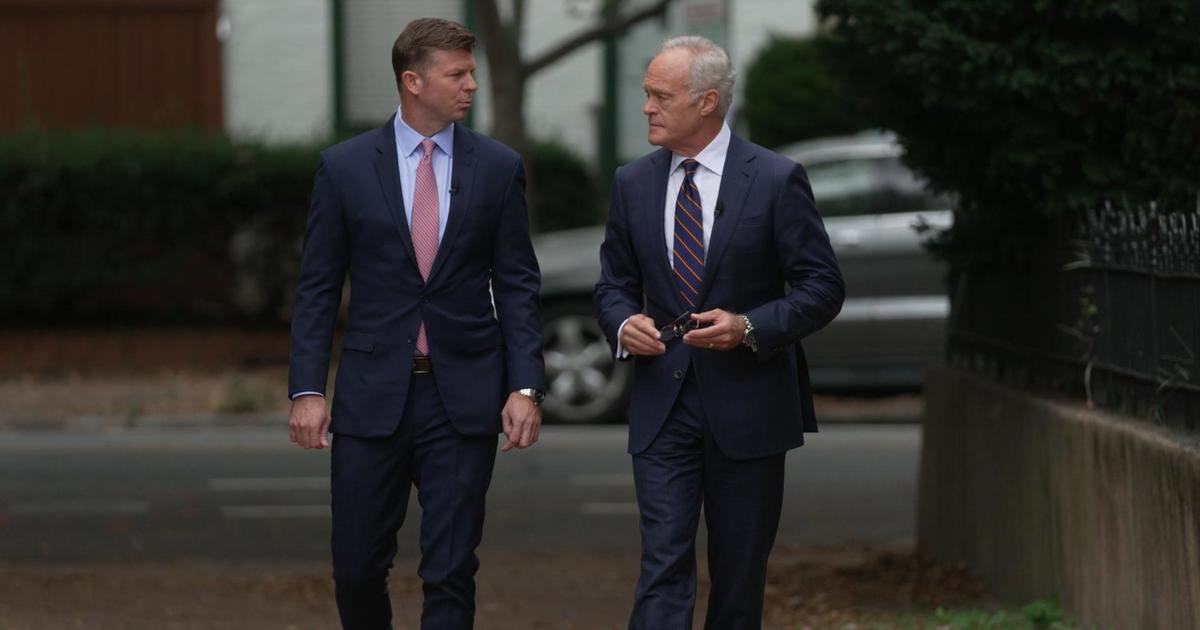The legal war in "prince v. spy"
An international case of "he said, he said" is playing out in court, and the stakes are high.
Saad Aljabri, a former top Saudi intelligence official, says in legal filings that he was marked for murder by Mohammed bin Salman, Saudi Arabia's crown prince. In response, the crown prince alleges that Aljabri misspent or stole billions of dollars of Saudi money. Meanwhile, the head of the U.S. intelligence community is concerned that the legal battles will reveal American state secrets as the court cases wear on.
There are three key lawsuits in this "prince v. spy" fight, one in Canada and two in the United States. Below is a short guide to these lawsuits and some of their key documents. In addition, a United Nations human rights group has recently weighed in on the detention of Aljabri's daughter, son and son-in-law by the Saudi government.
Aljabri's lawsuit against MBS
Aljabri first filed his lawsuit in August 2020 in U.S. District Court in Washington, DC. He updated the suit in February with this amended complaint.
The complaint alleges that Crown Prince Mohammed bin Salman sent a hit team to target Aljabri in Canada, and that the men involved — who are also listed as defendants — were intercepted and deported by authorities at Ottawa's international airport.
"Like the team that murdered Khashoggi, those sent to kill Dr. Saad … were also members of Defendant bin Salman's personal mercenary group, the Tiger Squad," Aljabri's complaint reads. "Carrying two bags of forensic tools, and complete with forensic personnel experienced with the clean-up of crime scenes … the Tiger Squad Defendants attempted to enter Canada covertly, traveling on tourist visas and seeking to avert the detection of Canadian border security by entering through separate kiosks."
According to the suit, bin Salman has prevented Aljabri's daughter Sarah and son Omar from leaving Saudi Arabia, where they are now in prison. The suit alleges Aljabri's son-in-law was rendered from Dubai, tortured in a Saudi prison, and forced to sign a confession. After he was released, Aljabri's complaint claims, he was arrested again.
The filing goes on to allege that Saudi students were used unsuccessfully by the Saudi government to find Aljabri and his family in the U.S.
This attack on Aljabri and his family, the complaint reads, is part of a larger pattern by bin Salman, which involves the creation of his own hit team to silence opponents.
Part of the evidence included in the complaint is a series of WhatsApp messages purported to be between Aljabri and bin Salman. Aljabri is seeking "punitive damages in an amount to be determined at trial," according to the complaint.
Mohammed bin Salman's motion to dismiss
In December 2020, the crown prince filed a motion to dismiss Aljabri's lawsuit. In it, he advances several arguments for why Aljabri's suit should be thrown out, including accusing Aljabri and associates of stealing or misspending $11 billion from the Saudi government's counter-terrorism fund.
In addition to these allegations of theft, the motion claims Aljabri has no standing in an American court and has failed to prove either emotional distress or an extrajudicial killing, since he is still alive. If students were used, the motion claims, no harm came from it.
Finally, the motion states that bin Salman, as the crown prince of Saudi Arabia, has immunity from legal action.
"The Crown Prince is the King's son and designated successor," the motion reads. "Together with the King, he sits at the apex of Saudi Arabia's government. He is entitled to status-based immunity from any suit in U.S. court. He is also entitled to conduct-based immunity because Aljabri's claims arise from the Crown Prince's alleged official acts."
The judge in the case has not yet ruled on the motion to dismiss.
Sakab Saudi Holding Company's Canadian complaint
Aljabri used to work for Prince Mohammad bin Nayef, the former head of Saudi intelligence who led the counter-terrorism fight against al Qaeda. Bin Nayef later became crown prince and heir to the throne, until 2017, when he was deposed and arrested by bin Salman.
Aljabri and bin Nayef once controlled the Sakab Saudi Holding Company. Sakab and its subsidiaries were created on the orders of the Saudi king, and their funding came through the counter-terrorism budget, which would eventually run into the billions.
Aljabri has said in other court filings that the various companies controlled by Sakab were essentially front companies — their real purpose was for carrying out intelligence operations. Those operations were often conducted jointly with the Central Intelligence Agency and other foreign intelligence agencies. Former senior U.S. intelligence officials have confirmed this to 60 Minutes.
After bin Salman replaced his cousin, bin Nayef, Sakab was placed under the control of the Public Investment Fund (PIF), and a new director was appointed. A complaint against Aljabri that Sakab filed in Canada, says that a series of financial audits revealed that about $3.5 billion was stolen from Sakab and its subsidiaries. Out of that, the lawsuit says more than $1 billion went to bin Nayef and that Aljabri fraudulently took close to $500 million.
Sakab's lawsuit contends that Aljabri illegally continued to run Sakab and the various fronts, even after he was fired as a minister of state by Saudi King Salman in late 2015. In its filings, Sakab says this case is about fraud, not front companies.
"The companies were used by a very high-ranking government official in the Saudi Arabian government to orchestrate, along with his immediate family and close family and friends, an international scheme to defraud the Plaintiff companies of billions of dollars, and then secreted the funds to offshore locations and enriched himself, his family and his friends," the complaint reads. "He then fled to Canada and now, to deflect attention from this massive theft, the former Saudi cabinet minister, Al Jabri, has launched a public relations campaign, including litigation against his former government to deflect attention from his theft."
The lawsuit was filed in Toronto, where Aljabri lives. On the day it filed, Sakab obtained two orders from the judge. One, known in Canada as a Mareva injunction, globally froze the assets of Aljabri and the other defendants, including members of his own family. The second order, a Norwich order, compels third parties to turn over any documents and materials related to the defendants.
Aljabri and his attorneys responded, first by appealing the Mareva and Norwich orders. They argued that Aljabri was not a fraudster and that, far from being a commercial dispute, the case was orchestrated by bin Salman to intimidate a political enemy.
The actual case has yet to be heard, but the Canadian judge ruled against Aljabri and upheld her original orders to freeze his assets, saying Sakab's attorneys had presented more than enough evidence to warrant the injunction.
U.S. intelligence steps in
Lawyers for Sakab went to courts in countries where they say Aljabri had holdings and, in an attempt to enforce the Canadian order, filed suits.
Because Aljabri and his family own eight condos in Boston, Sakab filed a lawsuit in Massachusetts state court to include them as part of the asset freeze ordered by the Canadian judge. Over the objections of Sakab's attorneys, Aljabri's lawyers successfully argued that the case should be moved to federal court.
That's where it got even more complicated.
Central to Aljabri's defense against Sakab is his claim that various parts of Sakab are actually front companies for Saudi intelligence to carry out counter-terrorism operations, sometimes in conjunction with the United States, against al Qaeda. Aljabri's lawyers argued that he might be forced to reveal top secret information about CIA operations as part of his defense.
That's when the United States government made an extraordinary intervention. Director of National Intelligence Avril Haines filed a sworn declaration in the Massachusetts case saying that she had to assert the state secret privilege to prevent the possible release of classified information.
In the declaration, Haines describes described the classified information as "concerning source, methods, capabilities, activities, or interests of the [U.S Intelligence Community], as well as information that might tend to reveal or disclose the identities of U.S. Government employees, affiliates, or offices with whom one or more of the parties or the Kingdom of Saudi Arabia may have had certain interactions and the disclosure of which would be damaging to U.S. national security interests."
Sakab said in response that what's at stake was simply enforcing the Canadian injunction as the case proceeds in Toronto. The company's lawyers in Massachusetts argued that Aljabri is trying to force dismissal of the U.S. case by invoking the threat of state secrets.
The judge agreed with the U.S. government that state secrets were involved and that Aljabri and his family "cannot fairly defend himself without resort to privileged information." The Massachusetts case against Aljabri was dismissed. However, in his order, the judge took no position on whether Aljabri had "lawfully obtained" the condos he bought in Massachusetts.
The U.S. government's argument about state secrets caught the attention of the Canadian government. At the request of the Canadian Security Intelligence Service, government lawyers filed a motion to prevent Dr. Aljabri and his attorneys from using classified material in his civil case there. If the motion is granted, it could ultimately lead to the case against Saad Aljabri being dismissed in Canada.
The United Nations weighs in
Although the United Nations has no direct legal standing in any of the cases, a U.N. a human rights group recently weighed in on the detention of Aljabri's daughter, son and son-in-law by the Saudi government. The Working Group in Arbitrary Detention issued a report saying "it is clear that the three individuals were deprived of their liberty against their will, with the involvement of government agents who refused to disclose their fate and whereabouts, and they were therefore subjected to enforced disappearance."
The U.N. group called on the Saudi government to release them "immediately and unconditionally."
The Working Group is part of the U.N.'s Human Rights Council and its opinions do not have the force of law, so it is unclear that its report will have any impact on the U.S. or Canadian lawsuits. The Saudi government, in its submission to the U.N. group, said the actions taken against Aljabri's children and son-in-law were not in retaliation against Dr. Aljabri and that they were afforded all their rights under Saudi law.
This article was originally published on October 24, 2021.



